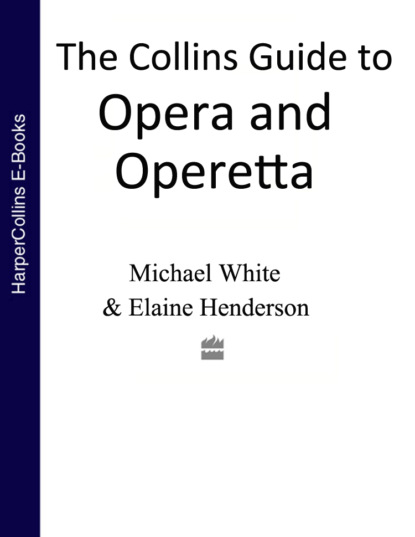По всем вопросам обращайтесь на: info@litportal.ru
(©) 2003-2024.
✖
The Collins Guide To Opera And Operetta
Автор
Год написания книги
2018
Настройки чтения
Размер шрифта
Высота строк
Поля
COMPOSER: Alexander Borodin (1833–87)
LIBRETTO: Alexander Borodin; after a sketch by Stasov
FIRST PERFORMANCE: St Petersburg, 4 November 1890
Principal Characters
Igor, Prince of Seversk
Baritone
Prince Galitsky, his brother-in-law
Bass
Vladimir, Igor’s son by his first wife
Tenor
Yaroslavna, Igor’s second wife
Soprano
Khan Konchak, Polovtsian prince
Bass
Konchakovna, Khan Konchak’s daughter
Mezzo-soprano
Ovlur, a Christian Polovtsian soldier
Tenor
Synopsis of the Plot
Setting: Putivl, a town in the Seversk region, and in the Polovtsian camp; 1185
PROLOGUE Igor is preparing to leave with his son, Vladimir, on a campaign against the pagan Polovtsian khans. He says a sorrowful farewell to his wife, Yaroslavna, and appoints Prince Galitsky to govern in his absence.
ACT I Yaroslavna misses Igor greatly, but Galitsky and his friends are enjoying themselves – even to the extent of kidnapping a young girl. Yaroslavna, coming to hear of this, argues fiercely with Galitsky and finally forces him to release the girl. After he leaves she receives bad news; Igor has been captured and the Polovtsians are marching on Putivl.
ACT II In the Polovtsian camp Konchakovna is looking forward to seeing the man she loves, Vladimir, who, like his father, has been captured. When he is brought in, under guard, they reaffirm their love for each other, unobserved by all except Ovlur, the Christian convert. Ovlur then offers to help Igor escape, but such a thing is against Igor’s code of honour and he refuses. Igor is well-treated by Konchak who tries to persuade him to become an ally; failing in this, Konchak offers him his freedom, in return for his promise not to fight the Polovtsians in future. Igor refuses. Nevertheless, Igor’s principles impress Konchak greatly and he entertains him with singing and dancing.
ACT III The Polovtsians are celebrating the victory of an allied army and the Russians realise that their countrymen’s situation is becoming desperate. So when Ovlur once again offers to help Igor escape, he accepts. Vladimir, however, is torn between love for his country and love for Konchakovna, who, having failed to persuade him to stay, raises the alarm as Igor and Vladimir are escaping. Igor evades capture but Vladimir does not. However, Konchak is prepared to be magnanimous; he offers Vladimir his freedom and gives him permission to marry Konchakovna.
ACT IV Sitting sadly on the town walls at Putivl, Yaroslavna suddenly sees Prince Igor approaching and is overjoyed. The bells announce his safe return and Igor emerges with his wife to general acclaim, ready once more to lead his people.
Music and Background
The sound-world of Prince Igor is colourful, bold, and a striking mix of Russian-Asian influences, with melodies that seem folk-like but are actually original to the composer. Much of the music was written by later hands, especially in Act III, which was left with large sections missing at Borodin’s death; and Rimsky-Korsakov’s orchestrations add a gloss that wouldn’t otherwise have been there. But the impact of this epic, tableau-like piece is undeniable, and it contains some of the best-loved melodies in all opera.
Highlights
More or less the whole of Act II which contains superb arias for most of the principal soloists, including Konchakovna’s lovely ‘Medlenno dyen ugasal’, and finishes with the celebrated ‘Polovtsian Dances’.
Did You Know?
Glazunov’s supreme achievement in the completion of Prince Igor was to have written out the overture (never committed to manuscript) from his memory of Borodin’s improvisation in private performances.
Recommended Recording
Boris Martinovich, Nikola Ghiuselev, Nicolai Ghiaurov, Alexandrina Milcheva, Sofia National Opera/Emil Tchakarov. Sony S3K 44878. The only current recording to include the whole of Act III, and very effective even though it doesn’t offer the star names (like Boris Christoff) of rival versions.
Benjamin Britten (#ulink_02f14b9f-62ec-5216-ac7a-bd77145d3a74)
(1913–76)
Paul Bunyan (1941)
Peter Grimes (1945)
The Rape of Lucretia (1946)
Albert Herring (1947)
The Little Sweep (1949)
Billy Budd (1951)
Gloriana (1953)
The Turn of the Screw (1954)
Noye’s Fludde (1957)
A Midsummer Night’s Dream (1960)
Curlew River (1964)
The Burning Fiery Furnace (1966)
The Prodigal Son (1968)
Owen ‘Wingrave (1970)
Death in Venice (1973)









